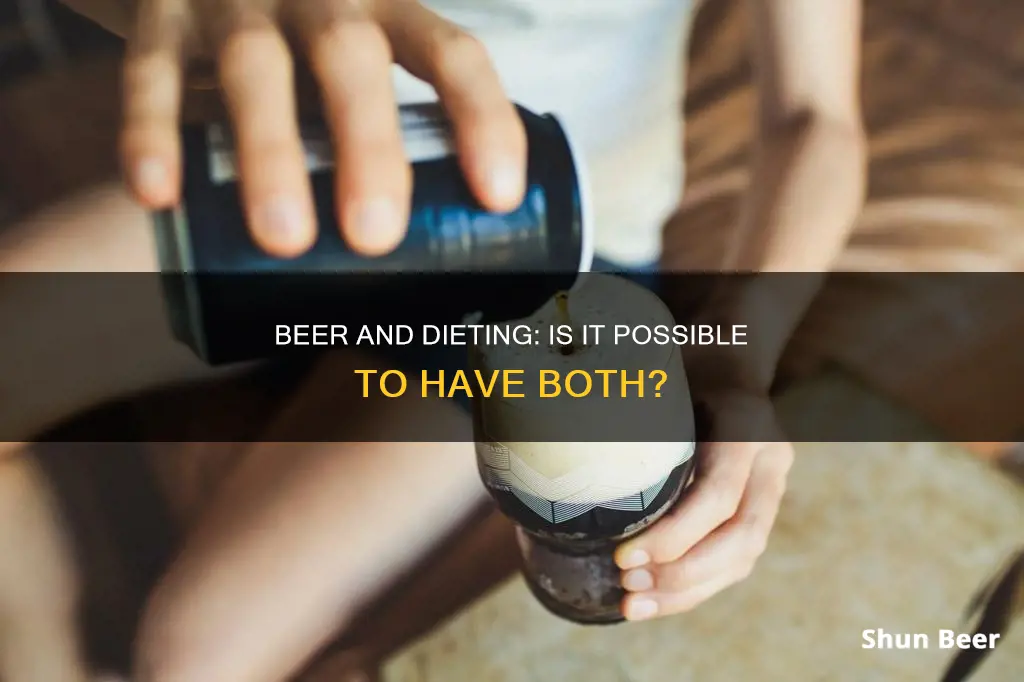
Beer and weight loss are not mutually exclusive, but it is challenging to lose weight while drinking beer. Beer is an empty calorie drink, providing almost no nutrients and making it easy to consume a lot of calories very quickly. Beer also inhibits the body's ability to burn fat. The key to drinking beer while dieting is moderation and planning. It's important to be mindful of the number and type of drinks you choose and how drinking affects your eating habits.
What You'll Learn
- Beer is an empty calorie as it provides almost no nutrients
- Beer is a liquid, meaning calories can be consumed quickly
- Alcohol is metabolised differently to other macronutrients
- Alcohol can cause a loss of self-control, leading to poor food choices
- Beer negatively affects sleep, which is linked to weight gain and muscle loss

Beer is an empty calorie as it provides almost no nutrients
Beer is often referred to as an "empty calorie" drink, meaning it provides a significant number of calories without offering any nutritional benefits. A typical beer contains around 150 calories, and if you consume several in one sitting, it can result in a substantial calorie overload. These calories are primarily derived from the alcohol content, which can range from 100 to 350 calories per 12-ounce glass, depending on the type of beer.
The issue with drinking beer or any alcoholic beverage while dieting is that it provides a quick source of energy that your body will prioritise over burning fat. Additionally, alcohol can increase your appetite, leading to poor food choices and further calorie intake. The combination of alcohol and sugary mixers or high-calorie bar snacks can significantly hinder weight loss efforts.
Beer is also a liquid, which means it is easy to consume calories quickly without feeling full. This can result in consuming more calories than your body needs, making it challenging to create a calorie deficit, which is essential for weight loss. Furthermore, drinking alcohol can disrupt your sleep, leading to weight gain and muscle loss.
While beer may not be the sole cause of a "beer belly," it is associated with increased waist circumference due to its impact on calorie intake and fat metabolism. To maintain a balanced diet while enjoying beer, it is recommended to limit consumption, opt for lower-calorie options, and be mindful of eating habits and portion sizes.
Bock Beer: Bottoms Up or Not?
You may want to see also

Beer is a liquid, meaning calories can be consumed quickly
Beer is mostly water by weight and volume, but most of its calories come from alcohol. The alcohol content is expressed as a percentage of alcohol by volume (% ABV). The higher the ABV, the higher the calories. A typical beer has 150 calories, and if you drink several in one sitting, you can end up with a serious calorie overload.
If you drink 5 beers, which is about 750 calories, you will still have room in your stomach for a full meal afterward. This is why drinking beer can make losing weight difficult. It is recommended to limit the number of beers you drink per week. The fewer beers you drink, the fewer empty calories you ingest.
Drinking Beer in Public: Utah's Unique Alcohol Laws
You may want to see also

Alcohol is metabolised differently to other macronutrients
Alcohol is metabolised differently from other macronutrients. It is not a macronutrient, but it does contain energy. Alcohol is metabolised in the liver, but 10-30% of it is also metabolised in the stomach. The liver can metabolise the amount of alcohol in one drink per hour.
Alcohol is metabolised by several processes or pathways. The most common of these pathways involves two enzymes: alcohol dehydrogenase (ADH) and aldehyde dehydrogenase (ALDH). These enzymes break down the alcohol molecule, allowing it to be eliminated from the body. First, ADH metabolises alcohol to acetaldehyde, a highly toxic and carcinogenic substance. Then, acetaldehyde is further metabolised to acetate, which is then broken down into water and carbon dioxide for easy elimination.
Other enzymes that break down alcohol include cytochrome P450 2E1 (CYP2E1) and catalase. However, CYP2E1 is only active after a person has consumed large amounts of alcohol, and catalase metabolises only a small fraction of alcohol in the body. Small amounts of alcohol are also removed by interacting with fatty acids to form compounds called fatty acid ethyl esters (FAEEs), which have been linked to liver and pancreas damage.
Alcohol is high in calories and can cause weight gain. It is challenging for those trying to manage their weight as it is difficult to determine which beers are high or low in calories. Regulators do not require calorie information to appear on beer, wine, or liquor containers. Some brewers voluntarily provide this information, especially if they are marketing a lower-calorie product.
If you are trying to lose weight, you can boost your efforts by cutting back on alcoholic drinks. However, you do not have to entirely cut out alcohol. It is possible to consume it more mindfully by watching the number and type of drinks you choose and how drinking affects your eating habits. Health experts recommend drinking in moderation, which means no more than one drink per day for women and no more than two drinks per day for men.
Beer and Itching: Is There a Connection?
You may want to see also

Alcohol can cause a loss of self-control, leading to poor food choices
Drinking alcohol can also negatively impact your sleep, which is directly linked to weight gain and muscle loss. A lack of quality sleep can increase your appetite for high-calorie, carbohydrate-dense foods, and you may feel less motivated to exercise.
To avoid the negative impacts of alcohol on your diet, it is important to drink in moderation and be mindful of the number and type of drinks you choose. You can also try alternating alcoholic drinks with non-alcoholic, low-calorie beverages, such as water or soda water, to reduce your overall alcohol and calorie intake.
Additionally, eating a healthy meal before drinking can help slow the absorption of alcohol into your bloodstream and may help you make better food choices. Knowing your limits and sticking to a drink limit before going out can also help you maintain self-control and avoid overeating or making poor food choices.
While it is possible to drink alcohol and still lose weight, it is important to be mindful of the potential challenges and to make conscious choices to mitigate the negative impacts on your diet and health.
Beer and Aligners: What You Need to Know
You may want to see also

Beer negatively affects sleep, which is linked to weight gain and muscle loss
Drinking beer, or any alcoholic beverage, can negatively impact your sleep, which in turn can lead to weight gain and muscle loss.
Alcohol affects your sleep cycle, reducing the quality of your sleep and causing frequent wakings. Even moderate amounts of alcohol consumed before bedtime can disrupt your sleep and leave you feeling tired the next day. This is because alcohol alters your sleep architecture, reducing the time spent in the REM stage of sleep, which is vital for learning and memory consolidation.
Additionally, alcohol can interfere with your circadian rhythm, the biological patterns that operate on a 24-hour clock. This disruption can lead to a misalignment between your sleep and wake cycles, resulting in feelings of alertness when you want to sleep and sleepiness when you want to be awake.
The negative impact of alcohol on sleep can have several consequences. Firstly, it can lead to weight gain. Sleep deprivation is associated with an increased risk of obesity and unhealthy dietary habits. Studies have shown that short sleep duration is a significant risk factor for weight gain and obesity. When individuals get less sleep, they tend to consume more calories, especially from snacks high in fat and carbohydrates. This increase in calorie intake can lead to weight gain and make it more challenging to maintain a healthy weight.
Secondly, lack of sleep can result in muscle loss. Sleep is crucial for muscle recovery and growth. During sleep, the body releases human growth hormone (HGH), which is necessary for muscle repair and growth. Sleep deprivation interferes with the release of HGH, hindering muscle recovery and growth. A study found that individuals who slept for only 5.5 hours had 60% less muscle mass compared to those who slept for 8.5 hours.
Therefore, if you are dieting or trying to maintain a healthy weight, it is essential to consider the impact of alcohol consumption on your sleep. Reducing alcohol intake, especially before bedtime, may help improve sleep quality and duration, which in turn can support weight management and muscle growth.
Beer Towers: How Do They Work?
You may want to see also
Frequently asked questions
Yes, but it is harder to create a caloric deficit if you drink every day. Beer is an "empty calorie" as it provides almost no nutrients and is in liquid form, meaning calories are consumed very quickly. Beer also contains alcohol, which is metabolised differently from other macronutrients.
Drink light or low % ABV beer, reduce your portion size, and drink less frequently.
Beer is high in calories and can contain as many calories as a meal. It also negatively affects your sleep, which is directly linked to weight gain and muscle loss.
Vodka, soda and lime, or tequila over ice with lime and a dash of soda.







